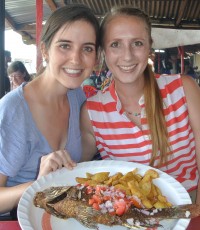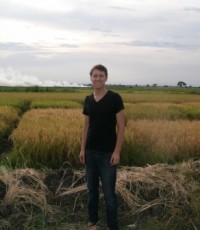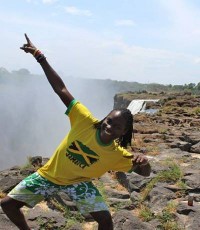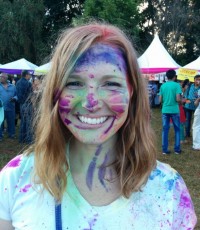May - June 2014
Dear Friends,
It’s official! We’ve placed another fantastic fellowship class. We recently welcomed our 2014-15 Fellows to Princeton for orientation. This year’s Fellows – 49 intelligent, passionate, and dynamic individuals – came together to prepare for the year ahead and to bond over shared interests and experiences – and have plenty of fun with the PiAf staff as well! We also enjoyed seeing so many PiAf alumni and friends connect (or reconnect) over the Princeton Reunions weekend at our post P-rade reception. Check out pictures of the new class of Fellows from our orientation (as well as photos from our Reunions events) here on our Facebook page.
Meanwhile, our 2013-14 Fellows are nearing the end of their year in Africa. Although we’re sad to see them leave their fellowship posts, we’re thrilled to see how many are pursuing graduate school, new jobs, and staying in Africa after their fellowships end. We look forward to welcoming them into the PiAf alumni family and seeing them grow into future leaders committed to the advancement of Africa.
As always, thank you for your ongoing interest in Princeton in Africa. We hope you enjoy this edition of the Fellows Flyer!
Warm regards,
Stephanie Hooper Leroy
Acting Executive Director*
*Executive Director Katie Henneman is currently on maternity leave.
PiAf Connections
Please click below to check out pictures of our Fellows, Alums and other members of the PiAf family meeting up at home and around Africa.
Notes from the Field
By Alie Altfeld, 2013-14 Fellow with eleQtra (InfraCo) in Uganda
After eight months in Uganda, life has settled down to work, hobbies, and friends, much like life anywhere in the world. Here are some highlights: Luganda, markets, malaria, and power plants.
Njogela Oluganda (I Speak Luganda)
My 12 weeks of Beginner Luganda lessons have come to an end, and according to my certificate, I did “Very Good.” Unfortunately, the real challenge of utilizing these Luganda lessons (and making a fool of myself in the process) begins now. With my newly found spare time I have taken up tennis lessons – incredibly, I managed to find something that I struggle at more than Luganda! Banage!
Ggaba Fish Market
On a recent Sunday, my roommates and I headed to the Ggaba Fish Market. After a bit of wandering around the market, during which one vendor called out to me, “Beyoncé, Beyoncé! Come look!” (really, Beyoncé?), we decided to have lunch. We sat down under a small covered area with plastic tables and chairs. A young girl came over and explained that they served whole fish, chips, and drinks, and so we ordered whole fish, chips, and drinks! She brought out several recently caught tilapia for us to choose from. We settled on a medium size fish with bulging eyes for 13,000 shillings ($5) for the four of us. She took the fish and returned five minutes later with a whole fried fish covered in tomatoes, onions, and fries. We waited for utensils and napkins. When she didn’t return, we realized that everyone around us was diving right in with their hands. After a momentary hesitation, we shrugged and started ripping pieces of the steaming hot fish. It was delicious and within minutes we had reduced the large fish to a mere pile of bones.
Malaria or the Flu?
The trouble with being sick in Africa is that everyone (myself included) automatically assumes you have some strange tropical disease. When I woke up sick one morning, my roommates and I self diagnosed and decided that I surely had malaria. Then once the malaria symptoms passed the next day (and my mom was full of worry), I surely had bilharzia. Then once the bilharzia symptoms passed the following day, I surely had some sort of parasite. Finally (after hours at the local medical clinic), I realized that I was probably (and thankfully!) just sick.
eleQtra Project in the News
After 10 months of working as a financial analyst with eleQtra, a leader in the development, investment, management and operation of private infrastructure in Sub-Saharan Africa, one of my projects has been announced to the public. The firm’s plans for a gas power plant in the oil-rich Lake Albert region of Uganda was recently profiled in Ugandan newspapers, the Observer and New Vision, as well as international news source, Bloomberg News. However, there is still substantial work to be done before the project is fully developed and construction begins. With the project in the papers (and my parents’ visit looming) pressure is mounting to make progress!
Notes from the Field
Erik Dolson, 2013-14 Fellow with Imani Development in Malawi
Sometimes I just have to sit back in amazement when I think of all the awesome projects I have been able to work on during my time at Imani Development in Malawi. Imani is a consulting firm based in Blantyre, Malawi, which focuses on private sector and agricultural development. Imani provides a whole range of consulting services ranging from program design and management to economic strategy development and policy formulation. At Imani, I have been involved in a number of extremely interesting projects, which have allowed me to put my economic and statistics background to good, practical use. Some of the projects I have worked on include developing Malawi’s Rice Development Strategy and working on a Feasibility Study for Establishing a Development Bank in Malawi.
One of my most notable and exciting projects at Imani has been working on developing Malawi’s National Industrial Policy. An Industrial Policy is a set of government policies and incentives that aims to speed up a country’s path to industrialization. The Industrial Policy development process involves extensive consultation with the private sector and government to understand the constraints to industrialization and private sector development and then to come up with creative solutions to address them. Working on this project has stretched my skill set and made me think about how to tackle the problems of development within the framework of government policy. This type of work is something that most economics students dream of because it puts you on the forefront of economic development and policy formulation within a country.
I cannot say that my experience in Africa this time around has fundamentally changed my worldview. But it has given me a new lens for understanding the field of development. I am learning the importance of “soft skills” like good communication and collaboration when developing policies and strategies to engineer development. Collaborating effectively with local clients and partners is essential for ensuring that their vision of development is translated into the policy and strategy that we develop. At my job and in my daily life, I am constantly learning small lessons that help me better understand the work that Imani does and the work that needs to be done in development. These lessons have shaped me into a more effective and thoughtful consultant, colleague, and development worker. I am excited to take these forward and continue building on them in the future.
Notes from the Field
Kwame Gayle, 2013-14 Fellow with Maru-a-Pula in Botswana
I am Kwame Gayle and I live and work in Botswana.
When I first came here, my heart was elsewhere. I was happy to be back on the continent but I was happier to be so close to South Africa. That is where my heart was. I had studied abroad there and had fallen in love with that country’s rich, vibrant cultures. Now that I was nearby, I anticipated frequent visits there.
Given the academic calendar at Maru-a-Pula School, where I work as a Junior History/Geography Teacher and a part-time assistant to the director of the school’s theater, I didn’t get to take a trip south until the Christmas holidays. I booked a four-week trip to visit Johannesburg and Cape Town, respectively. It was fun but, by the third week, something unexpected happened. I started longing for ‘home.’ And this home I longed for was… Botswana.
Going away for a while made me realize that Botswana was slowly but surely infecting me with its kind people, vibrant culture and unique language (Setswana). I had missed how peaceful and clean Gaborone is. I missed my wonderful students and their bright faces during each class. I missed my coworkers’ daily greeting and warm hearts. I missed my new friends and the social network I had become a part of. I wanted to go home.
In that moment, as I sat in a hostel in Cape Town, I decided to always give a fair chance to each place I travel. I had been unfair to Botswana at first by not being open and interested to learn more about her. Now, I have fallen in love with yet another country and Botswana will forever have a piece of my heart.
I am Kwame Gayle and I live, work and am happy in Botswana.
Notes from the Field
By Yash Gharat, 2013-14 Fellow with Olam International in Zambia
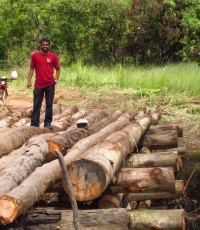
Yash standing atop a wooden bridge that Olam helped the community build. He got to lead the logistical coordination and construction!
My fellowship year in Zambia with Olam International began in September. It was not exactly the stuff that dreams are made of. I had had too little time at home, and logistical issues regarding moving to Zambia had compounded my frustrations. As I sat in the car for 10 hours, traveling 900 km from Lusaka to Kasama in northern Zambia (where I am based), I had plenty of time to reflect on the remoteness of my fellowship posting. I was going to be working as a Corporate Responsibility & Sustainability Associate for Olam on their coffee estates in northern Zambia, and though it sounded really exciting, I was afraid that my expectations would exceed the reality.
But that was eight months ago. As I sit writing this today under marvelous blue skies on a beautiful sunny evening, I can say quite confidently that Zambia has won me over. It has been a slow, gradual process. The first two months of my fellowship were extremely tough. All it kept coming back to was the fact that I had no social life, and that I was too remote to really travel anywhere. Transitions are always tough, and even though I had always prided myself on being adaptable, I found it difficult to adapt to my new reality.
The adjustment came in small doses of patience. Living in the middle of quaint, rural northern Zambia has taught me patience. I had to be patient when I thought that things at work just did not move; turns out, they do move, if you go through the right channels and make a good case for yourself. I had to be patient when I was frustrated with my location; though slow at first, my travels have gained pace, and I have visited three African countries as well as India since September. I had to be patient with Zambia herself. Having experienced Kenya and Tanzania, I was initially disappointed with the lack of a tangible cultural vibe in Zambia. In my mind, East Africa was like Manhattan, and Zambia was like New Jersey. Things were just too easy, too safe, too plain. There was no excitement. And yet, today I find myself liking the Zambian attitude of taking things easy, the non-aggressiveness and the sincere respect and affection that is part of the culture. Even the landscape, which seemed so dull at first compared to the vast savannahs and towering mountains of East Africa, grew on me.
I am very aware of how lucky I am to have received this opportunity. The professional value of this experience has always been clear to me; I have learned much about corporate sustainability, agribusiness, project design, implementation and management, business development and supply chains. On the personal front, however, the gains have been slightly harder to measure. It is only now, while writing this article, that I have realized the true personal gains that I have made during the past eight months.
Notes from the Field
By Katy Johnson, 2013-14 Fellow with International Rescue Committee (Somalia) in Kenya
This list cannot do justice to how amazing my fellowship with IRC Somalia has been, but here are the A-Zs of what I will miss:
A – Artcaffe: A restaurant in Nairobi that has provided a setting for many wonderful brunches.
B – Benson: My cab driver and one of the sweetest individuals I’ve ever met.
C – Cupcakes: Nothing better than an afternoon break for cupcakes from the nearby cafe!
D – Diani: A beautiful beach city and the retreat location for the Fellows in East Africa.
E – Ethiopian food: My new favorite food.
F – Friends: I have made some incredible friends here that I will miss dearly.
G – Guesthouse: I live in the IRC Guesthouse with colleagues from all over. Did I mention our wonderful housekeeper Selina comes five days a week?
H – The Hood: The local bar right across the street.
I – IRC: I couldn’t have asked for a better fellowship posting. I have absolutely loved working for IRC Somalia and will sincerely miss it.
J – Jillian Michaels: While I look forward to moving to a city where I can afford a gym, I will always have fond memories of working out with Jillian Michaels DVDs in the guesthouse.
K – Kilimani: My neighborhood in Nairobi, a lovely area with lots to do.
L – Learning: I have learned more than I ever thought possible during my fellowship.
M – Music: I will very much miss going out and dancing to East and West African hip hop.
N – Naivasha: A town located just outside of Nairobi with incredible camping and hiking.
O – Opportunities: IRC Somalia presents innumerable opportunities to its Fellows.
P – Princeton in Africa Fellows: Nairobi hosts six Fellows, and I am extremely lucky to call them my best friends. I will also miss the whole Princeton in Africa fellowship class!
Q – Quiet of the arboretum: Every once in a while, it is great to escape the craziness of Nairobi and walk around the arboretum.
R – Rolex: A delicious Ugandan delicacy – a fried egg in a chapati. Delicious.
S – Somalia: I had never studied Somalia before working at IRC, and I sincerely hope to focus on Somalia again in the future.
T – Tusker: My favorite Kenyan beer.
U – Ugandan hip hop concert: I rang in the New Year at a hip hop concert in Kampala. I will never forget the moment when fireworks went off at midnight and I thought, “Is this really my life?”
V – Variety: There is always something new to do in Nairobi. Two examples – celebrating Holi and going to a party celebrating the toilet!
W – Weather: I cannot stress this enough – Nairobi has the perfect climate.
X – (E)Xploration: (please excuse the terrible stretch but this one wasn’t easy!) I have had the opportunity to travel quite a bit both within Kenya and in Uganda, Rwanda, and Ethiopia.
Y – Yaya Centre: The nearby mall where I can find everything I need.
Z – Zebras: Kenya’s wildlife is incredible and a safari with my parents was one of the best parts of my year.
Notes from the Field
By Ryan Kirlin, 2013-14 Fellow with World Food Programme in Senegal
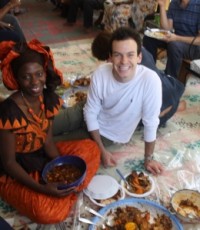
Ryan enjoying thieboudienne – a traditional dish in Senegal – with a friend and colleague at a WFP office-wide weekend lunch.
My passion for understanding and addressing food injustices is matched only by my passion for eating. Working with the Nutrition unit at the WFP Dakar Regional Bureau has proven to suit these tastes, so I thank PiAf and my high metabolism for affording me the opportunity to explore these passions so fervently.
Food has been a lens through which I’ve been able to view cultural structures in Senegal, and my gastronomic adventures have reaffirmed the notion that the experience of eating fills much more in my life than just my stomach. Like Proust’s madeleines, the foods that have shaped my time in Dakar will continue to evoke memories of time and place far beyond the end of my fellowship year. Here’s an appetizer.
Mussels and Fish – Equal parts delicious, inexpensive, and fresh, the seafood in Dakar is best enjoyed one way: in copious amounts. At the Mamelles beach, a five minute walk from where I live, my friend As dives for mussels that we then roast in between swims and pick-up soccer matches with the usual neighborhood crew. Outlets that Eliza [Warren-Shriner], Kaitlyn [Neuberger], and I have explored with our friends include shellfish eating competitions, fish markets, and grillades in the backyard. Grilled fish was on the menu at my Mamelles beach bonfire birthday party, and good thing too, because the event was star-studded. Although this may sound like a nice way to describe my friends, I just mean it literally; footballer El Hadji Diouf stopped by.
Baguettes – Some of the first friends I met in Senegal are the hilarious employees at the boulangerie by my house. They offer great insight, constantly blast Tupac, and occasionally offer me free pastries. All the key qualities I look for in friendship.
Lakh, Fondé, Ngalakh – These yogurt-based desserts are typically consumed during celebrations. I’ve enjoyed lakh at work and in homes across Dakar after naming ceremonies of newborns, and have since tried ngalakh over Easter weekend. My friend Ousmane introduced me to fondé and, although not tied to a particular festivity, the dish reminds me of Korité and Tabaski–Muslim holidays I celebrated with his family in Keur Massar. The added bonuses of consuming these delicacies have been learning exchanges in Wolof, visiting new neighborhoods, and gaining a better understanding of how religion informs culture in Senegal.
Coconuts –They taste best after beach volleyball, a run with HASH harriers, or a Dakar-Gorée 4.5km open water swim.
La Parrilla – While at this Argentinian restaurant one day with two South American colleagues, I couldn’t determine what impressed me most: the incredible quality of the meat, the blend of four cultures and three languages, or how this cultural multiplicity had become so familiar to me. The amazing diversity of restaurants in Dakar parallels that of those who call the city home. Working in a unit with nine colleagues who claim eight nationalities comes with some great food perks. I’ve consumed (read: devoured) briouat and ghriyba from Morocco, chocolates from France, nan mburu from the Gambia, and kilichi from Niger, all thanks to my colleagues. This diversity expands to my entire office too, meaning that the idea of discussing East African politics over lunch with colleagues from Rwanda and Uganda isn’t far-fetched. Having studied abroad in Kenya, I tried to offer my two cents.
Notes from the Field
By Sarah Rawson, 2013-14 Fellow with World Food Programme in Malawi
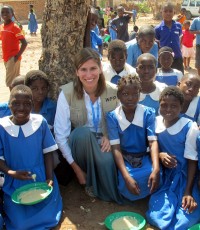
Sarah visiting with students at a primary school in southern Malawi to assess the impact of WFP’s school meals program.
I’ve now been working with the U.N. World Food Programme for 11 months in the Reports and Communications unit of the Malawi Country Office. Most days are a mixed-bag of pressing deadlines to meet, but the days I treasure most are those where I get out of the office, leave my laptop behind, and head into rural Malawi to connect with the people and communities we serve. It’s through these project visits that my preconceptions about “big, bad aid” have truly been challenged and where I’ve learned that big aid can indeed make great impacts.
I’m reminded of one day I spent with a group of about 250 farmers in southern Malawi who participated in a WFP Food for Asset Creation (FFA) program in 2004. Their community was suffering from chronic hunger and WFP had been coming in each year to distribute food aid. To help the farmers and their families overcome this annual challenge, WFP provided construction materials and monthly food in exchange for the community’s construction of a productive asset over a 1 year period.
The goal of an FFA project like this is to help communities build their resilience so that they break free from the cycle of hunger and can transition off of food assistance toward self-sufficiency for the long term. The types of assets built under this WFP program vary from community to community because each community decides amongst itself what to build, and where and how to build it.
This particular group cultivates near Mount Mulanje (the tallest mountain in central Africa), where streams flow down into a larger gurgling river. The farmers decided to capitalize on this natural resource and build an irrigation scheme, a series of pipes that divert water from the river into small canals which then distribute water to their crop fields year round.
For these farmers, instead of relying on one harvest a year, they now have enough water to harvest 3-4 times a year and have even been able to sell a surplus, spending the earned income on school fees, medical visits, stronger houses and fertilizer to improve yields in the next harvest. The community has maintained the irrigation scheme on its own now for the past 10 years and, since then, has never needed WFP food aid.
This day remains an important part of my experience because it is a simple and very promising example of success in an “industry” that admittedly often fails. It has become very clear to me that WFP is in fact changing with time — swiftly moving away from top-down aid and towards community-owned initiatives that are actually helping people to improve their lives. As an organization, it’s getting smarter, embracing innovation and creativity, and strategically using resources to achieve the U.N. Secretary General’s Zero Hunger Challenge – to eliminate hunger in our lifetimes. Being part of the conversations that are driving this exciting shift in Malawi energizes me to play my role in working to meet the food and nutrition needs of the most vulnerable every day.
Notes from the Field
By Kristin Schmitz, 2013-14 Fellow with Save the Children in Ethiopia
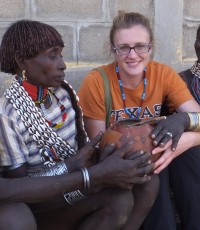
Kristin drinking local beer with Hammer women, following a community dialogue on Save the Children’s health and education programs.
I came to Addis Ababa from Kampala, but even after having already lived in East Africa, it was a huge adjustment! Upon arriving, I was impressed by the presence of sidewalks and curbs, amazing macchiatos, the array of international restaurants, and the lack of red dirt that completely destroyed my shoes in Kampala. I was disappointed in the lack of cashews and boda bodas. How was I going to get around?
My work at Save the Children involved coordinating development and humanitarian proposals across seven technical sectors for international government and UN donors. My schedule remained hectic and it was not uncommon for me to be on eight proposals at a time. I had previously only worked at small organizations, so working at the largest NGO in the country was a huge adjustment. Previously, I had only worked in violence prevention, legal aid, and reproductive health, but I now needed to write and review proposals on emergency nutrition, WASH mechanisms, and pastoral livelihoods.
Fortunately, having a generalist position helped further define the areas I wanted to specialize in once my fellowship came to an end. My interest in gender-based violence prevention expanded to include child protection and my interest in reproductive health expanded to include rights issues surrounding children and adolescents such as female genital cutting and early marriage. Overall, I grew to recognize the importance of sustainable livelihoods and income generation programs in initiatives aimed at empowering women and children.
The times I spent in the field were the most instrumental. I was able to travel to Afar to work on two proposals geared at pastoral populations and spent a month in southern Ethiopia working on several concept notes involving child protection, health, education, water and sanitation, and livelihoods. One of my favorite periods involved conducting interviews and focus group discussions with girls and community health workers in Afar on female genital cutting, child marriage, unsafe abortions, and the importance of behavior change communication and women and children’s empowerment initiatives in reproductive health programs. I was also able to witness the results of our community-based education and behavior change communication campaigns firsthand while visiting the Hammer and other tribal communities in South Omo. I learned how vastly child protection issues differed among tribal groups. For instance, the Dessenech cut 100% of their girls while their Hammer neighbors consider a cut girl “mingi,” a term used to identify people who are thought to be cursed and whose presence would inevitably lead to catastrophes. I saw how children were becoming empowered to lead change in their communities, resulting in improved child protection mechanisms and outcomes, and witnessed how young boys were standing up for their sisters and female friends by educating their tribal leaders on the dangers of female genital cutting and pledging to support and marry uncut girls.
The following are some important lessons I took away from the last eight months.
- Work-life balance is incredibly important, especially at a giant international NGO, and I’m often guilty of being completely consumed by my work.
- Life at home doesn’t stop when you move abroad. Problems will arise and it is incredibly difficult to help those you love with shoddy internet, phone service, an 11-hour time difference, etc. Sometimes, you need to learn to identify what you can and cannot manage while abroad.
- Designing quality mobile health and child protection programs in pastoral communities requires innovation and unique mobile programs that not every NGO is willing to take on.
- Infanticide in the form of ‘mingi’ still exists. These parents love their children, but they also love their communities and fear the results that “inevitable” drought and famine will bring to their communities if they let their children live. In these areas, it is a sin to preference your child’s well-being over everyone else’s. However, innovative community-based education campaigns and behavior change communications geared at highlighting child rights issues can inspire communities to discard these long-held traditions.
- It is possible to develop caffeine dependency. Thanks to Ethiopia’s amazing coffee, I now require 4-6 cups a day!


